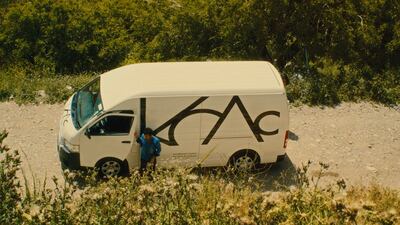In the Kurdistan region of Iraq, a small white van is more than just a vehicle – it is a lifeline for a rich cultural heritage under threat. The van has been converted into a mobile digitisation hub by the Kurdistan Centre for Arts and Culture, an NGO based in Erbil.
Carrying specialised scanners, it travels across the mountainous Kurdistan region collecting images of literary treasures, documents, photographs and artworks to help preserve a culture at risk of being lost forever. The objective of the mission is twofold, says Fateh Rebar, the centre's public relations manager.
“We aim to preserve the Kurdish culture – whether that will be archival items, art or anything that is related to our culture, and also we want to promote it to the international audience,” he told The National. Founded a year ago, the centre launched its digital archive in May with a collection of more 2,000 items, including rare manuscripts, magazines, photographs and ephemera dating from as far back as 1770 to present times, that offer a window into life in the Kurdistan region.
At the beginning, many collectors were reluctant to give valuable items to a newly founded organisation for fear they might be damaged or lost. "We built this van with a vision," Mr Rebar said. "You don’t need to hand over your books to us; we come to you, scan them, and then return them right there. It’s fast, convenient, and it allows us to preserve without disruption."

The centre seeks out not only items related to Iraqi Kurds, but also those from Kurdish-majority areas in Iran, Turkey and Syria. It also has books that were published in other countries and in other languages – such as Arabic, Ottoman Turkish, Persian and Russian – and brought to the Kurdistan region. “This isn't necessarily about only Kurdish people, this is about what was in Kurdistan libraries,” he said.
The Kurds are one of the largest stateless ethnic groups in the world, with about 30 million concentrated in an area straddling Turkey, Iraq, Iran and Syria. A minority in all four countries, the Kurds speak their own language, with several dialects.
Denied their own state when colonial powers drew the map of the modern Middle East after the fall of the Ottoman Empire, the Kurds have long pushed for autonomy or outright independence, sometimes peacefully, at other times through armed rebellion.
In Iraq, the Kurds repeatedly rose up against the central government throughout the 20th century. In the 1980s, they were accused by Saddam Hussein of siding with Iran during Iran-Iraq war. To punish them, Saddam launched a scorched-earth campaign and chemical attacks, which together killed an estimated 50,000 people.
The US imposed a no-fly zone after the 1990 Gulf War that allowed the Kurds to exercise de facto autonomy in northern Iraq and made them a close ally of the US. The Kurds formalised their autonomy after the 2003 US-led invasion that toppled Saddam, and the Kurdish region emerged as an oasis of relative stability in post-invasion Iraq, largely spared the violence that plagued the rest of the country.
“Unfortunately, during the past decades we had been so much tortured and killed, and villages have been burnt to the ground mainly due to chemical attacks,” Mr Rebar said. “Not only the people were killed, but also mosques, libraries and universities were destroyed,” he added, saying some of the collections they found had been buried by their owners to protect them.

The KCAC employs cutting-edge technology usually found in large global archives, such as the Mohammed Bin Rashid Library in Dubai. It allows users to search within scanned text, making it easier for scholars, researchers and everyday users to locate specific references.
"You can type any word, and it will pinpoint where it appears within our collections," Mr Rebar explained. "This capability makes Kurdish resources more accessible than before. Libraries in Kurdistan have limited hours, but this archive is always open, allowing researchers and the public alike to access invaluable information any time."
The archive's contents range from religious and grammar books from the 1770s and Ottoman-period decrees appointing local officials, to property deeds, old Kurdish folk stories named after 16th-century Kurdish princess Xanzad, Kurdish newspapers and magazines and photos of prominent Kurdish figures.
The process starts with finding collections or items that are valuable enough to be added to the archive, either by approaching known well-known collectors or by word of mouth. Then the van and its crew led by Rebeen Hawezy, who has previously worked as a data entry specialist and computer technician, hit the road, heading through the rolling hills of Kurdistan. Using state-of-the-art scanners installed in the van, they digitise centuries-old books, manuscripts or photographs, ensuring that the stories and knowledge of the past live on in the digital age.
“What we are doing is very important. The archiving, especially in Kurdistan, is not taken care of. The work we are doing is according to international standards,” Mr Hawezy said.
“The people love it; they always welcome us and provide us with anything we need. They like what we do, they usually get very excited about it."


